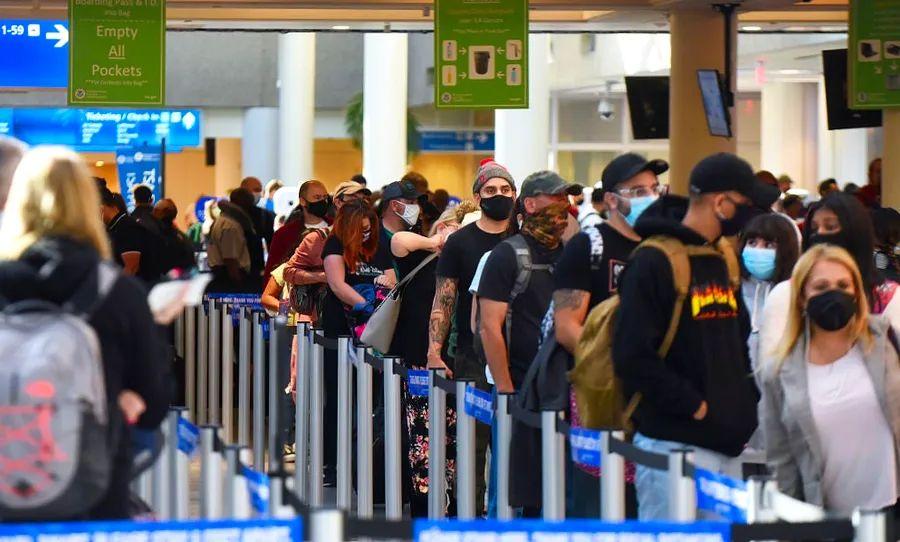Here's what we know about the U.S. reopening on November 8


As the United States approaches its reopening on November 8, the CDC, State Department, and White House have released detailed guidance regarding vaccination and testing protocols for travelers arriving in the U.S. this week.
As announced on October 15, the U.S. will welcome fully vaccinated international travelers and returning citizens starting November 8.
"With today's announcement, non-U.S. citizens who are not immigrants must be fully vaccinated and provide proof of vaccination to enter the United States starting November 8," stated the CDC in a press release. "Very few exceptions will apply, such as for children under 18 years old."
Non-U.S. citizens must present vaccination proof to enter.
Starting November 8, all non-U.S. citizens must present proof of vaccination to enter the U.S. Passengers are deemed fully vaccinated 14 days after their last dose of a one- or two-dose vaccine.
Acceptable vaccines include those authorized or approved by the FDA or listed for emergency use by the WHO, such as Pfizer-BioNTech, Moderna, Johnson & Johnson, AstraZeneca, Covishield, Sinopharm, and Sinovac. More details on acceptable COVID-19 vaccines can be found on the CDC website, though the CDC chose not to comment for this article.
Travelers must present their vaccination record to airlines as proof, which can be a physical copy, a photo, or a digital version. Airlines will verify that the record comes from an official source in the country where the vaccine was administered, according to the State Department.
Pre-departure testing remains mandatory for everyone, regardless of vaccination status.
U.S. citizens entering the country do not need to provide vaccination proof, but all travelers aged 2 and over, regardless of their vaccination status, must undergo a pre-departure test, either a rapid antigen or PCR test.
According to new guidance issued on October 25, unvaccinated travelers will face stricter testing protocols, requiring proof of a negative test taken within one day before traveling to the U.S., along with a second test upon arrival. In contrast, vaccinated travelers need to present a negative test result taken within three days of their departure.
"All fully vaccinated air travelers, regardless of their citizenship, must present a negative COVID-19 test taken no more than three days prior to boarding their flight to the United States," stated the CDC. "For those who are not fully vaccinated, the timeframe will shorten to require a test taken no more than one day before their departure to the U.S."
As a result, vaccinated U.S. citizens must still provide proof of vaccination to their airline prior to departing for the U.S. to be eligible for the three-day testing requirement, according to the State Department.
Travelers under the age of 18 are exempt from vaccination mandates but are still required to undergo pre-departure testing.
"Children under 18 are not subject to the vaccination requirement for foreign travelers, considering that some younger children are ineligible for vaccination and that access to vaccines varies globally for older eligible children," the State Department explains, adding that children aged 2 to 17 must still provide pre-departure test results.
Unvaccinated children accompanying fully vaccinated adults may present a negative test result obtained within three days prior to departure, aligning with the testing schedule for fully vaccinated adults. However, unvaccinated children traveling alone or with unvaccinated adults are required to meet the one-day testing rule.
Children under the age of 2 are exempt from any testing requirements.
Contact tracing
In addition to the testing and vaccination proof requirements, all arriving air travelers must provide their contact information to airlines before boarding to facilitate COVID-19 contact tracing.
"This measure will help airlines coordinate with public health agencies to share necessary information, ensuring public safety and awareness, and enhancing their ability to quickly identify and notify individuals in the U.S. who may have been exposed to contagious diseases like COVID-19," the CDC stated.
In summary
While the Presidential Proclamation issued by President Joe Biden earlier this week and the subsequent CDC Order focus on air travel, a White House official previously indicated to TPG that similar regulations are expected to extend to land border crossings.
"Beginning November 8, foreign nationals entering the U.S. via land borders with Canada and Mexico, or arriving by passenger ferry for non-essential purposes—such as visiting friends or tourism—will need to be fully vaccinated," they stated via email. "These travelers must be ready to confirm their vaccination status and present proof to a CBP officer if requested. By January, full vaccination will be required for foreign nationals crossing the land border for both essential and non-essential purposes."

1

2

3

4

5
Evaluation :
5/5